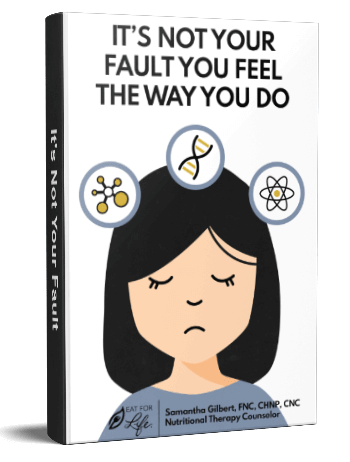Gluten Intolerance or Oxidative Stress?
Of all the health challenges I work with in my practice, gluten intolerance, or more specifically, sensitivity to a wide variety of foods, is the biggie. But is it gluten intolerance or oxidative stress?
Yet despite all the information available today on nutrition during gluten Intolerance, avoidance of the major triggers such as sugar, gluten, dairy, and soy, while supporting gut microflora; folks still struggle with multiple issues.
And it’s not just the major inflammatory triggers anymore. These days it’s things we consider healthy such as lemons, spinach and avocados.
So what’s really going on?
Well, what’s labeled food sensitivity or intolerance is actually oxidative stress.
Now oxidative stress may seem like a complex term, but it’s really just the result of the body’s inability to detoxify the harmful effects of free radicals.
Free radicals are “free” because they are missing a critical molecule. Because this molecule is missing, they’ll do anything they can to pair with another molecule. In other words, it’s basically an all-out war of injuring cells and damaging DNA to get what they want. With DNA damaged, cells become mutated, and quickly grow and reproduce abnormally.
And it’s this very process, passed down generation after generation, that’s put us in such a terrible war these days with our health.
This is when we start to see things like chronic fatigue, inflammatory bowel diseases, cancer, autoimmune disorders, ADHD, heart disease, depression, autism, and Alzheimer’s disease.
Cognitive impairments are a result of oxidative stress and typically include problems with digesting food.
For years I thought I was meant to be a vegetarian because I really didn’t like meat, but it wasn’t the meat. It was the fact that I was overloaded in copper and didn’t make enough methyl to support my system enough to break it down properly. When the body can’t break things down, it can’t absorb the micro and macronutrients needed to be nourished and satisfied.
So, in order to prevent free radical damage, the body uses its defense system of antioxidants.
Antioxidants are molecules that interact with free radicals to terminate the chain reaction before vital molecules are damaged. Key antioxidants and protective nutrients include glutathione, cysteine, zinc, selenium, catalase, metallothionein, and vitamins C and E.
I liken it to Teddy Roosevelt’s belief that a strong defense was the best guarantee of peace. Antioxidants are how we build up the body to make it strong and healthy, just like Roosevelt built up the Navy and sent it around the world.
And the really cool part is that when oxidative stress is diminished, the body is allowed to thrive and thus enjoy a wider variety of healthy foods.
If you know of someone who struggles with digestive challenges, please share this post. It is through sharing our stories that we create community, eliminate guilt and shame, and bring about healing.



Most people who say there gluten intolerant are wheat intolerant in Ireland people who are really coeliacs can’t have spelt some people diagnosis themselves
Avoiding dairy, I notice a difference immediately with health and symptoms return immediately if I have dairy. What time I was pretty I don’t notice any difference at all. Does this mean I’m not sweet are gluten intolerant?
But, I do actually seem to feel better when I eat something whole grain breads like a hundred percent whole grain oat flour or some wheat bread.
Sorry my crazy smartphone was on auto correct by accident and changed what I was wrtong, please disregard and I will rewrite
What is your opinion on adding lemons to water or ice tea?
How does someone get this testing? I do not live in your area.
Hi Gillian,
I can get you properly tested. Click here to schedule a complimentary consult to see how I can help.
So you are saying we can overcome gluten intolerance by managing oxidation?
Yes, by eliminating oxidative stress. Keep in mind however that these foods by their very nature are inflammatory due to seed over processing and hybridization so I don’t recommend them even for those with no such issues.
Thanks do much for replying! That is encouraging! I wonder does the over processing and hybridization also apply to such strains as einkorn wheat. I guess I am hoping I could find it might be a decent alternative.
Hi Kathy,
You are most welcome. Heirloom varieties such as Einkorn tend to be better tolerated, but it’s really up to each person’s biochemistry as to what does and does not work. The best thing to do is try and see how your body responds. Generally though, I recommend eliminating gluten entirely.
Thanks so very much for your response. I really appreciate it.
So then am I to conclude that people with gluten I tolerance can potentially manage their oxidation to the point of overcoming such intolerance?
Absolutely. When it comes to gluten/casein intolerances, all are related to oxidative stress. The food didn’t create the intolerance, but it’s definitely an inflammatory trigger.
When you get hair testing does it matter if you color your hair..so many people do.?
Hi Mercedes,
It’s important to test non-colored hair, so please let it grow out before testing.
This was a great article! 2 questions:
1) What lab test did get and where did you have it done to find out that you were overloaded in copper?
2) How did you know you were under – methylating? Was it due to your symptoms, lab tests for homocysteine & sulfation, or because you knew what your genetic snps were for methylation?
I’m not sure how Sami did it, but I can guess that since she works with the Walsh Research Institute she used her serum copper and ceruloplasmin (CP) levels, as my psysician did who was trained by them in this. This enables the determination of the percentage of copper which is not bound by CP, and therefore a toxic free radical heavy metal.
Similarly, overall methylation is primarily determined using whole blood histamine as a marker. High levels are indicative of undermethylation (UM), low levels indicate ocermethylation (UM). This is an indirect marker only and is less accurate than the SAMe/SAH ratio, but easier to perform and more widely available. Homocysteine is also used in conjunction with this.
There are several articles on this excellent website which cover these issues, I strongly recommend them.